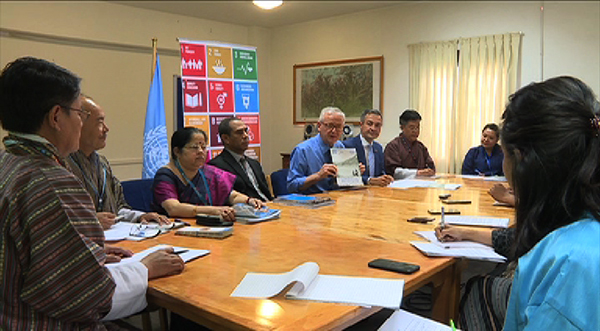 To assist Bhutan combat climate change and its impacts, the United Nations (UN) in Bhutan will be spending 40 per cent of their resources to work on climate action. Agriculture is at the forefront of the various projects planned under climate action. This is highlighted in the UN in Bhutan’s annual result report released yesterday.
To assist Bhutan combat climate change and its impacts, the United Nations (UN) in Bhutan will be spending 40 per cent of their resources to work on climate action. Agriculture is at the forefront of the various projects planned under climate action. This is highlighted in the UN in Bhutan’s annual result report released yesterday.
The report highlights that Bhutan is exposed to ill effects of climate change through erratic weather patterns, fast receding glaciers and risks of GLOF despite its commitment to remain carbon neutral for all time.
The UN in Bhutan plans to make agriculture more resilient to climate change. They have been able to secure US $ 25.3 M from Green Climate Fund.
The UN in Bhutan plans to make agriculture more resilient to climate change. To this effect, the UN in Bhutan has been able to secure US$ 25.3 M from the Green Climate Fund. UN officials in the country said there are various projects in the pipeline to mitigate and adapt to climate change.
“We also have been able to work to mitigate landslides in Phuentshogling and we are working with the national weather centre to make weather forecast more predictable. We all know that farmers have been affected by changing weather patterns. On the mitigation side, we are working with the Royal Government on making the transportation sector more green and clean by reducing GHG. The first activity is 300 taxis will become electric and it’s a new project with funding from the Green Environment facility,” Jurgen Nagler, the Dy. Resident Representative of UNDP Bhutan, said.
“If we don’t adapt to climate change then one of the concerns some people have is that the rate of rural-urban migration could increase. We already have too many gungtongs here in Bhutan. By adapting wisely to the climate change we can anticipate, we can ensure that those people who live in rural areas live well,” Gerald Daly, the Resident Coordinator of UN in Bhutan, said.
UN in Bhutan aims to help Bhutan address and tackle climate change and its impacts by building the capacity of Bhutanese scholars to study climate change and to secure funds from international communities for Bhutan to combat climate change.
“How can those young students in Bhutan who are studying anything to do with climate studies, how can we make sure that they have the best resources possible so that not only are they creating or having BA Degrees but over the time masters programmes and it may seem very optimistic today in 2019 but we need to be anticipating that someday we will have PhD programmes in climate studies.” Gerald Daly said.
“In Bhutan, we are working very closely with the royal government, GNHC, NEC and the agriculture ministry to come up with a national adaptation plan. So it is important that we do know how we can better prepare for the expected climate change to happen and to develop new innovative proposals to secure additional funding from the international community to Bhutan,” Jurgen Nagler said.
In 2018, the UN in Bhutan spent over US$15 M to support Bhutan achieves its development priorities and the major chunk of it was spent on climate action.












